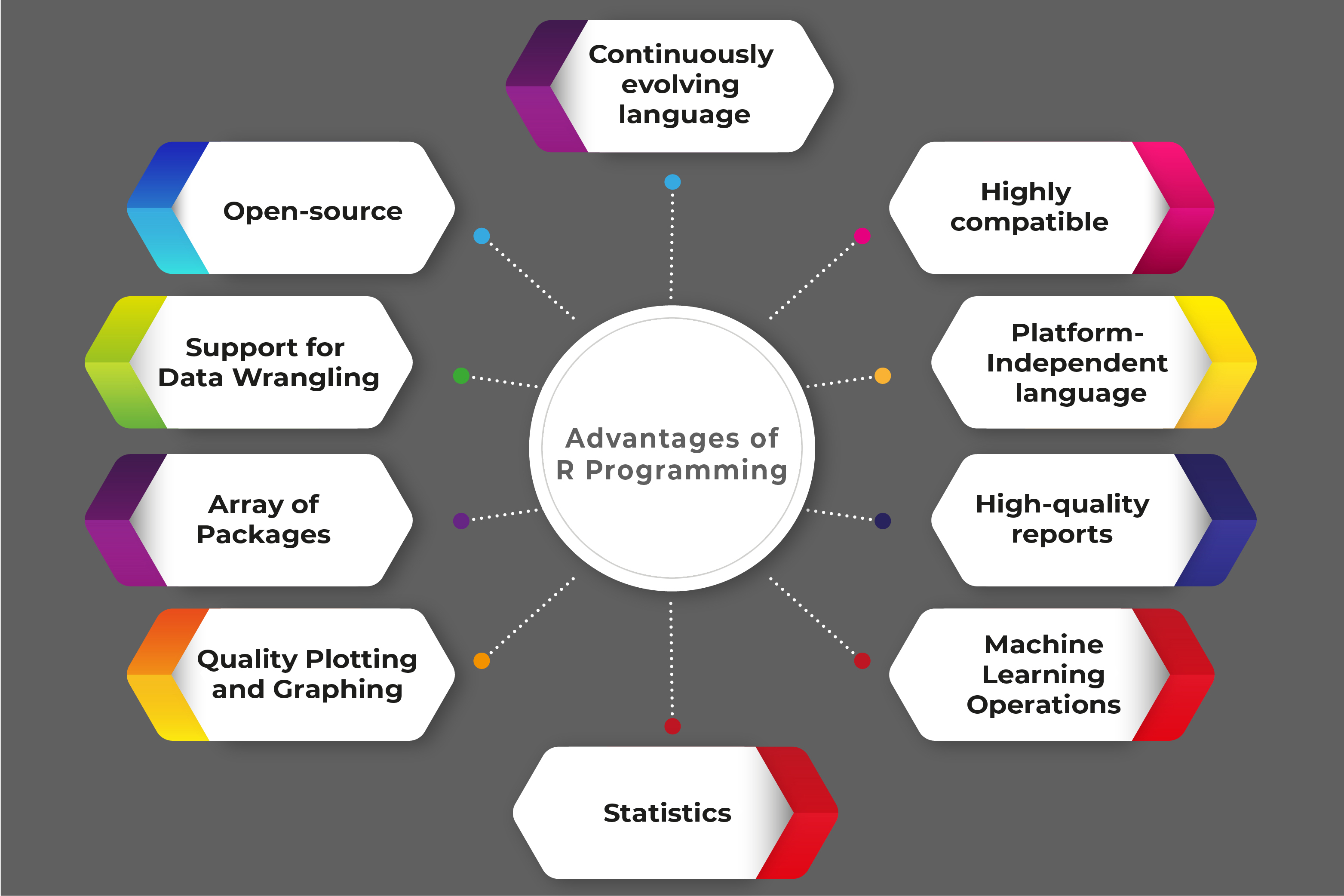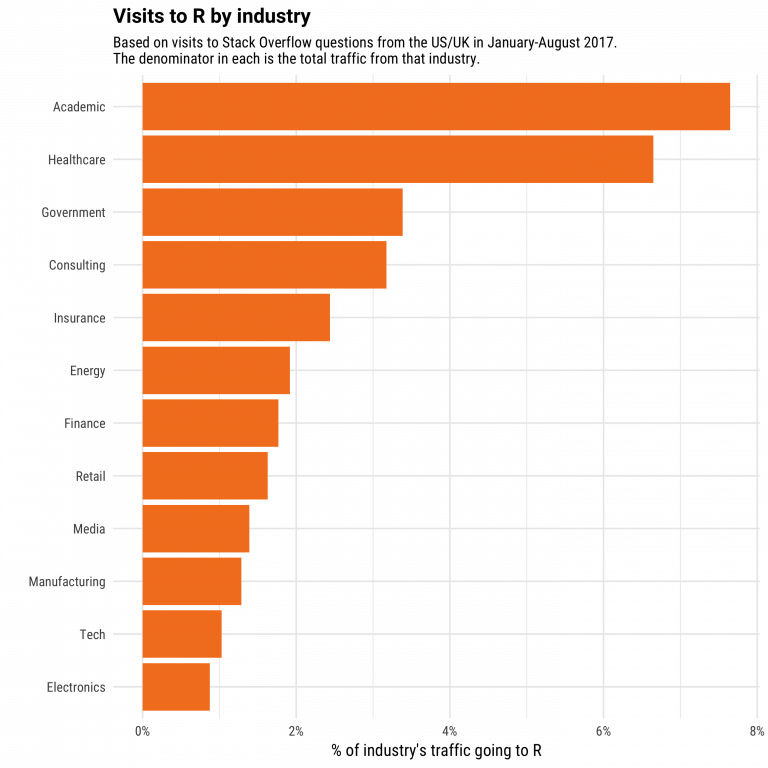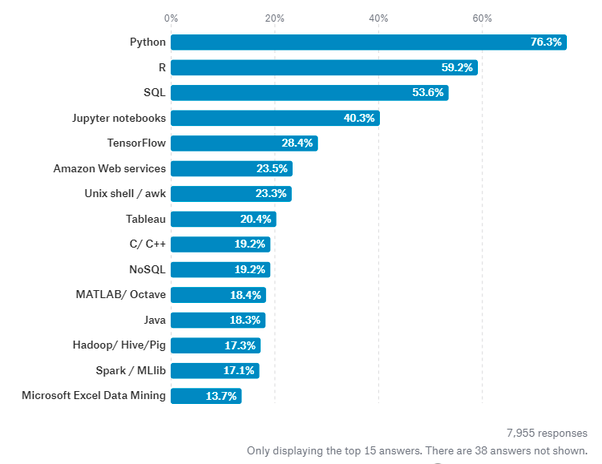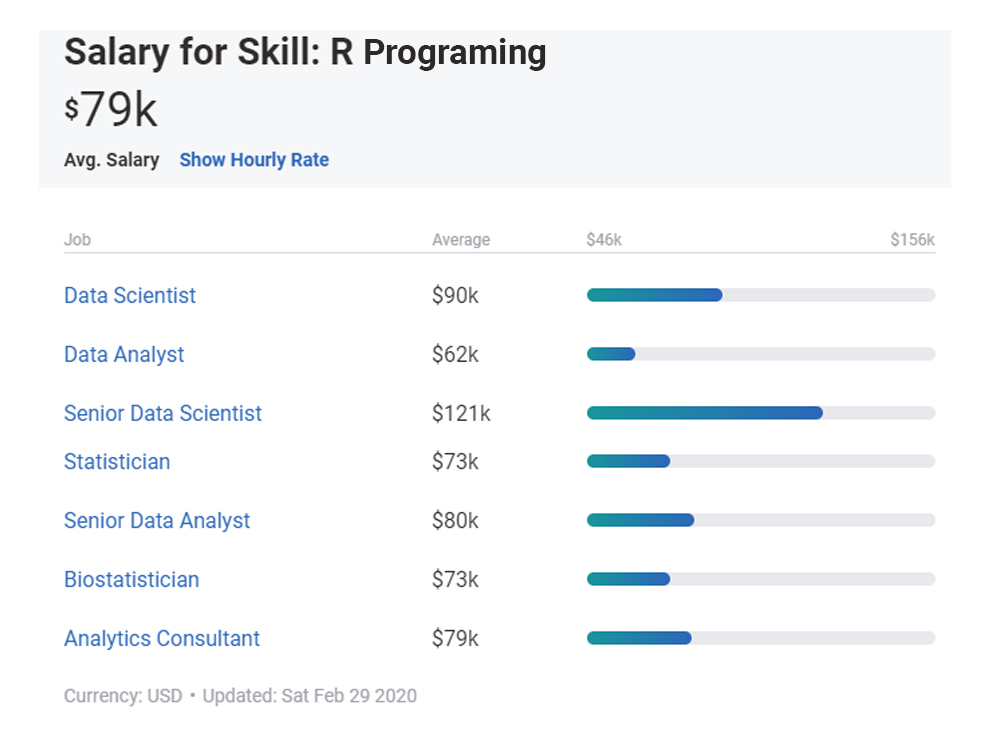
R Programming is an open-source programming language and analytical tool used by Data Scientists, Data Miners, Software Programmers, Statistics to facilitate the performance of statistical operations. R programming is one of the most popular languages used for Data Analytics.
In the recent ranking on the popularity of programming languages for March 2021 by TIOBE, R is one of the top programming languages in terms of popularity. R is used in many sectors of the industries such as,
- Finance
- Banking
- Healthcare
- Healthcare
- Social Media
- E-Commerce
- Manufacturing
As mentioned before, R is an open-source programming language and can be obtained for free from the website: www.r-project.org and the packages available for free are called CRAN.
Command lines are to be followed and executed by the user in a prompt.
The R project was developed by Ross Ihaka and Robert Gentleman and released in 1992, its first version in 1995 and a stable beta version in the year 2000.
The final release of the recent version of R-Programming, R version 4.0.0 (Arbor Day) prerelease versions is expected on 04.24.2020
What are the features of R-Programming in Data Science?
The features of R-Programming are:
- R is a comprehensive programming language and considered as a primary language for Data Science and it provides support for object-oriented programming with generic functions for developing web applications.
- In order to facilitate programming with functions, there are more than 10,000 packages in the repository of R programming to help in different fields that deal with data.
- R is an interpreter based language and makes the development of code easier.
- R produces portable and machine-independent code that facilitates easy debugging of errors in the code.
- R language helps in complex operations with vectors, arrays, data frames as well as other data objects that have varying sizes.
- R can be integrated with other technologies such as Hadoop and programming languages like C, C++, Python, Java, FORTRAN, and JavaScript.
- R packages can be installed and used on any OS in any software environment.
How to perform data analysis through R programming?
The following steps are to be followed to perform data analysis through R programming:
- Import
- Transform
- Visualize
- Model
- Communicate
Import: The first step is to import data stored in files, databases, HTML tables to the R environment. To perform data analysis it is required to convert or import all the stored data into R data.
Transform: The data collected is transformed into tabular form. The columns of the table are made variable by keeping rows for an observation.
Visualize: In this step, the graphical representation of the data is used to make the data more understandable. The graphical representation of the data helps in recognizing the pattern and allows to convey the information quickly.
Model: Models are created as a complementary tool for visualization. These models are used to answer the question related to the observations. The models are computational tools.
Communicate: In this step, the results obtained from visualization and models are communicated to others. It enables the user to produce well-designed print- quality plots for sharing.
What are the advantages of R programming?
The various advantages of the R programming language are:

Open-source
R is an open-source programming language. The user can even customize the packages, resolve the issues or generate a new package.
Support for Data Wrangling
R program holds the capability of transforming any data into structured data. The packages like dplyr, readr can support Data Wrangling. Data wrangling helps the user to easily scale the process of large volume of data.
Array of Packages
There are more than 10,000 packages in the CRAN repository and it is constantly growing. The packages are available for all the industries.
Quality Plotting and Graphing
R facilitates quality plotting and graphing. The popular libraries like ggplot2 and plotly provides visually appealing graphs
Highly compatible
R is highly compatible and can be integrated with many other programming languages like C, C++, Java, and Python. It can also be integrated with technologies like Hadoop and various other database management systems.
Platform-Independent language
R is a platform-independent language. R is a cross-platform programming language and can be used on Windows, Linux, and Mac.
High-quality reports
The reports can be created embedded with data, plots and R scripts easily using packages life shiny and markdown. Interactive web apps can be created to customize the report according to the requirement.
Machine Learning Operations
R programming enables machine learning operations like classification, regression and also provides features for developing artificial neural networks.
Statistics
R is known as the lingua franca of statistics. It is mainly used to create statistical tools.
Continuously evolving language
R is a constantly evolving programming language. R has a strong user base and will continue to grow in the future.
What are the job opportunities for R Programmers?
R is a constantly evolving language and there is a huge demand for certified R programmers all over the world. It is one of the most popular programming languages used by Data Scientists.
According to KDnuggets,
There are about 50,000 R programmers in the world. The US has over 25% of all R programmers. The second position is India, with about 4000 to 6000 R Programmers (the US has twice this number or a bit more). Canada has over 1000 R Programmers.
R programming is not only used in the IT sector. There are many industries using R programming to transform the problems into solutions. The industries in which the R programming is in demand are:

R programming is one of the most used languages among data scientists. It is used for statistical inference, data analysis, and Machine Learning.
According to a survey conducted by KCnuggets,
Almost 60 % of 7955 respondents prefer R Programming language.

According to Payscale.com average annual salary is drawn by a certified R programmer is:

For more information on how iCert Global can help you to achieve your Data Science Certification goals, please visit our Data Science Certification Training Courses on our website.
The Data Scientist certification validates data scientist’s knowledge on SAS, R, Hadoop, Python and Spark and how to use data concepts such as data exploration, visualization hypothesis testing, and predictive analytics. There is a huge demand for Data Scientists in industries like Aerospace industry, IT industry, e-commerce industry, and healthcare industry.
Know more about our Professional Certification Training Courses for preparing for the above certifications.
AWS Certified Solutions Architect Certification Training Courses
Big Data Certification Training Courses
Data Science Certification Training Courses
CRISC Certification Training Courses
CISM Certification Training Courses
PMP Certification Training Courses
Free Download: PMP Practice Test with 200 Questions
CEH Certification Training Courses
CSM Certification Training Courses
We provide instructor-led classroom and instructor-led live online training across the globe. We also provide Corporate Training for enterprise workforce development.
Connect with us:
- Subscribe to our YouTube Channel
iCert Global conducts Project Management, Quality Management, Business Analysis, Agile, Scrum, and DevOps Certification courses across various locations in the United States.
Visit us at https://www.icertglobal.com/ for more information about our professional certification training courses or Call Now! on +1-713-287-1187 / +1-713-287-1214 or e-mail us at info {at} icertglobal {dot} com.
Comments (0)
Write a Comment
Your email address will not be published. Required fields are marked (*)


















.webp)



 (3).webp)

.webp)

